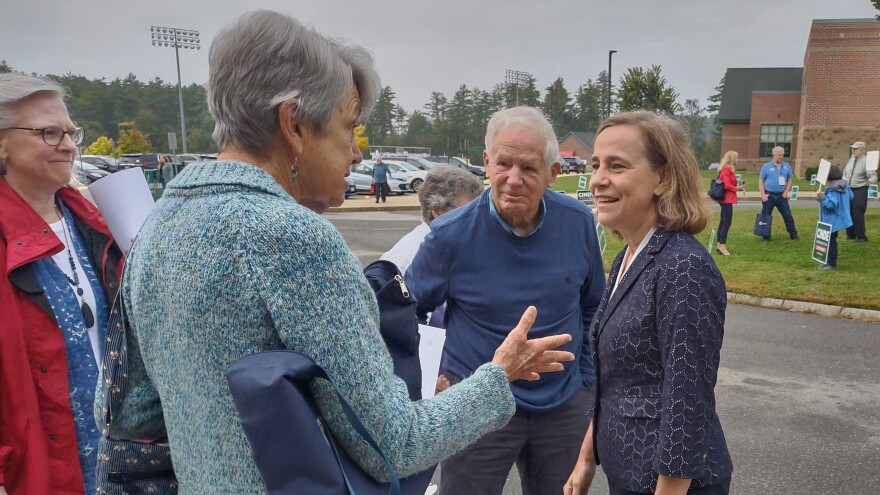EDITOR'S NOTE: News stories often have far more to say than one headline might be able to share. With that in mind, this is another installment of Reporter's Notebook, an occasional series that will offer deeper looks into recent news articles by the LehighValleyNews.com staff.
BEDFORD, NH — I spent less than 48 hours in New Hampshire, but the state's unique brand of politics jumped out pretty quickly.
Pennsylvania is a critical swing state. Locals anticipate big names will visit ahead of major elections. It's becoming especially true of the Lehigh Valley, which has developed a reputation as a battleground district. You may not catch Vice President Kamala Harris or US Sen. Ted Cruz in person, but it's a safe bet you'll see a news clip of someone of their ilk appearing somewhere like Northampton Community College or the Hamilton Family Diner.
New Hampshire has a national reputation for retail politics. Its small size and population makes it a realistic possibility for candidates to appear before any voter willing to put in an effort. And because New Hampshire hosts the nation's first presidential primary, those national figures are typically happy to oblige.
"People expect to meet the candidates," said Joyce Craig, one of two Democrats running for governor of New Hampshire next year. "So we do a lot of door knocking, phone calling, meetings, house parties. It's really great because you get to meet people where you are and building lasting relationships."
I'm pretty jaded when it comes to interacting with politicians, but most people in the Lehigh Valley are excited to meet national candidates and leaders of their party. There's an element of star power to the moment. Even Shapiro's comments to the Lehigh Valley Economic Development Corp. earlier this year generated some of that energy.
That wasn't the case for the 500 or so people who showed up at Bedford High School. While they were eager to hear from Gov. Josh Shapiro Saturday, it didn't carry a breathless "I-can't-believe-THEY'RE-here" vibe. Perhaps it's a sign Shapiro lacks a national profile, but I got the impression it was more of the crowd being familiar with moment.

As a St. Anselm College professor told me a week ago, politicians considering a run for president find excuses to visit New Hampshire. A strong finish in an early primary can earn them their party's nomination or at least advance their political career. I'd doubt Pete Buttigieg becomes secretary of transportation if he doesn't win the Iowa caucus and finish second in the New Hampshire primary over more accomplished opponents.
So New Hampshire voters smirk knowingly when an ambitious politician looking to make a name for themselves shows up in town. Art Gatzoulis, of Manchester, NH, said he's been seeing it for decades. He recalls when an unknown Georgia governor named Jimmy Carter started making the rounds.
"We see it all the time in New Hampshire. Politicians are here years and years before a presidential primary. We kind of look at each other and say this guy has aspirations," said Gatzoulis, 57. "We know what's going on. They're not here to say hello."
It could be the only person at Bedford High School who didn't think Shapiro will run for president is Shapiro himself. During a minute-long gaggle with reporters, he denied he's seeking higher office.
"Nah, I'm just happy to be here and support the party and make sure we share our message of progress in Pennsylvania," he said.
Shapiro didn't lie at any point during his address, but it lacked important context at points. A chief example was on education, where he touted his administration for a historic increase in school funding.
He didn't mention that his budget isn't fully funded yet. Or that the increase in education funding still fails to meet the standards mandated by a Commonwealth Court ruling. The crowd booed school vouchers earlier in the morning, so it's probably no surprise he didn't mention his support for vouchers during his speech.
Shapiro also brought up his support for abortion rights, where his record better matches New Hampshire's tastes. His election likely stopped Republican efforts to pass stricter abortion limits in Pennsylvania, and he halted a state contract with Real Alternatives, an anti-abortion group that operated counseling centers across the commonwealth for decades.
Still, Pennsylvania and New Hampshire are at different places in the national debate. Pennsylvania outlaws most abortions beyond 24 weeks, and its been that way for decades. That policy generally matches polling, which finds most Pennsylvanians are split on abortion with most favoring some limits.
Meanwhile, New Hampshire Gov. Chris Sununu signed an abortion law in 2021 that created harsher abortion limits in the state — the same 24-week cutoff Pennsylvania has. Polling from New Hampshire determined most residents think there should be few if any restrictions on abortion, however.


